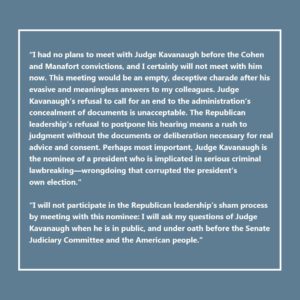I have long supported the principle of an “independent” federal judiciary, whose members are given jobs for life if they choose to stay at their post for as long as they draw breath.
The nation’s founders established it all at the beginning, giving the president the power to select these individuals and the U.S. Senate to confirm them.
My thoughts — naive though they were — believed that such independence would insulate judges from political pressure.
Oh, man! I was as wrong as I could be.
Brett Kavanaugh has provided us just yet another example of how mistaken I have been. Donald J. Trump selected him to succeed Anthony Kennedy on the U.S. Supreme Court. The president has made his judicial preferences clear: He intends to nominate judges who will toss out Roe v. Wade, the landmark ruling that legalized abortion.
Thus, the political wind has swirled all over Judge Kavanaugh. He has said something about Roe being “settled law,” which gave pro-choice advocates some hope that he would leave the ruling alone were he to have to decide a case down the road.
Others aren’t so sure.
Presidential elections surely have consequences. Trump won the 2016 election and already has won the confirmation of Neil Gorsuch to the nation’s highest court. Kavanaugh is set to join the court.
Is he free of political pressure? No. He isn’t. Not by a long shot. Indeed, all federal judges — from trial bench judges, to all level of appellate court judges — face political pressure. It doesn’t let up after they take their seats on the bench. Yes, it gathers incredible steam as they seek confirmation.
I won’t back down from my strong belief in presidential appointment of federal judges. Their lifetime jobs give them some semblance of independence from run-of-the-mill political pressure.
Sadly, it doesn’t eliminate it.





